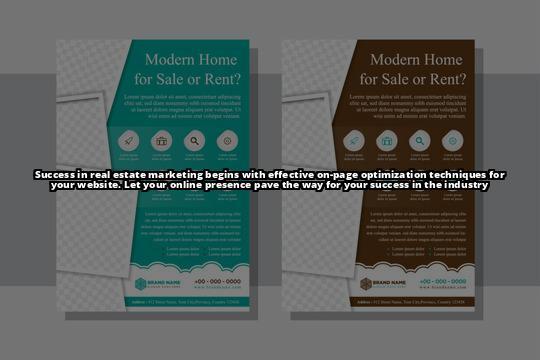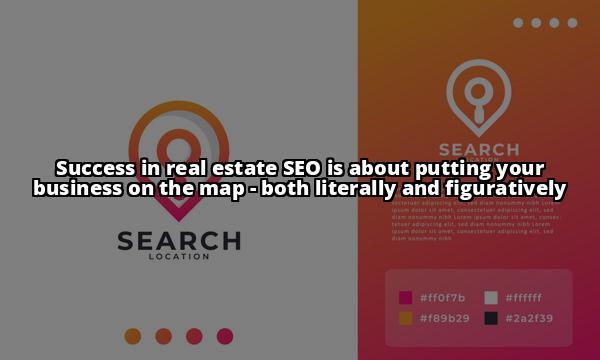Learn about SEO for Real Estate Websites
In this article, you will learn:
– The importance and benefits of implementing SEO strategies for real estate websites.
– Techniques for conducting keyword research, on-page optimization, local SEO, and mobile optimization.
– Strategies for link building, social media integration, and staying updated with SEO trends.
Is SEO Essential for Real Estate Websites?
Is SEO essential for real estate websites? In today’s digital age, having a strong online presence is crucial for any business, and real estate is no exception. With the majority of potential buyers and sellers turning to the internet to search for properties and real estate services, it is essential for real estate websites to rank well in search engine results. This is where Search Engine Optimization (SEO) comes into play. Implementing effective SEO strategies can significantly boost the visibility of your real estate website and drive organic traffic, ultimately leading to increased conversions and success in the competitive market.
In this article, we will explore the importance of SEO for real estate websites and discuss various strategies and techniques to optimize your website for better search engine rankings. We will cover everything from keyword research to on-page optimization, content creation, local SEO, mobile optimization, link building, social media integration, user experience optimization, and more. By the end of this article, you will have a clear understanding of how to leverage SEO to maximize the visibility and success of your real estate website.
Understanding the Importance of SEO for Real Estate Websites
When it comes to real estate, the competition is fierce. There are countless websites vying for the attention of potential buyers and sellers. In such a crowded marketplace, having a well-optimized website can make all the difference. Here are a few key benefits of implementing SEO strategies for your real estate website:
- Improved Visibility: By optimizing your website for relevant keywords, you can improve its visibility in search engine results. This means that when potential buyers or sellers search for terms related to real estate in your area, your website will be more likely to appear at the top of the search results, increasing the chances of attracting organic traffic.
- Increased Organic Traffic: Higher visibility in search engine results leads to increased organic traffic to your website. Organic traffic refers to visitors who find your website through unpaid search results, as opposed to paid advertisements. Organic traffic is highly valuable as it indicates that people are actively searching for the services you offer, making them more likely to convert into leads or customers.
- Boosted Conversions: SEO is not just about driving traffic to your website; it’s also about attracting the right kind of traffic. By targeting specific keywords and optimizing your website content, you can attract visitors who are genuinely interested in your real estate services. This targeted traffic is more likely to convert into leads, inquiries, or sales, ultimately boosting your business’s bottom line.
Now that we understand the importance of SEO for real estate websites, let’s delve into the various strategies and techniques that can help you achieve better search engine rankings and maximize your website’s visibility.

Comprehensive Keyword Research for Real Estate Websites
Keyword research is the foundation of any successful SEO campaign, and it holds particular importance for real estate websites. Effective keyword research involves identifying the terms and phrases that potential buyers and sellers are using to search for properties and real estate services. By targeting these keywords in your website content, you can increase your chances of ranking well in search engine results.
To conduct comprehensive keyword research for your real estate website, consider the following steps:
- Understand Your Target Audience: Gain insights into your target audience’s demographics, interests, and preferences. This will help you identify the keywords they are likely to use when searching for real estate services.
- Use Keyword Research Tools: Utilize keyword research tools like Google Keyword Planner, SEMrush, or Ahrefs to discover relevant keywords with high search volume and low competition. These tools provide valuable data on search volume, keyword difficulty, and related keywords.
- Identify Local Keywords: Real estate is a location-specific industry, so it is essential to target keywords that are relevant to your local area. Include location-specific keywords such as city names, neighborhoods, or landmarks to attract local buyers and sellers.
- Focus on Long-Tail Keywords: Long-tail keywords are longer and more specific keyword phrases that typically have lower search volume but higher conversion potential. These keywords often indicate that the searcher is in the consideration or decision-making stage of the buying process. For example, instead of targeting a broad keyword like “homes for sale,” you could target a long-tail keyword like “luxury waterfront homes for sale in [city name].”
By conducting comprehensive keyword research and targeting the right keywords, you can optimize your real estate website to attract highly relevant traffic and increase your chances of converting visitors into leads or customers.

On-Page Optimization Techniques for Real Estate Websites
On-page optimization refers to the process of optimizing various elements on your website to improve its visibility and search engine rankings. Here are some key on-page optimization techniques specifically tailored for real estate websites:
- Optimize Page Titles and Meta Descriptions: Include relevant keywords in your page titles and meta descriptions to help search engines understand the content of your pages. Craft compelling meta descriptions that entice users to click on your website in search results.
- Create Relevant and Engaging Headings: Use headings to structure your content and incorporate keywords naturally to signal to search engines what your content is about.
- Write Unique and Informative Content: Create high-quality, unique, and informative content that addresses the needs and interests of your target audience. Incorporate relevant keywords naturally throughout your content.
- Optimize URL Structure: Use descriptive and keyword-rich URLs for your real estate website’s pages to help search engines understand the context of your pages.
By implementing these on-page optimization techniques, you can improve your real estate website’s visibility, attract organic traffic, and provide a better user experience.
Importance of Incorporating Keywords Naturally and Strategically
When optimizing your real estate website for search engines, it’s important to incorporate keywords naturally and strategically throughout your content. Keyword placement plays a significant role in search engine rankings, but it’s crucial to strike a balance and avoid over-optimization.
Search engines are becoming increasingly sophisticated at understanding the context and semantics of content. They can recognize when keywords are used naturally and when they are forced. Here are a few tips for incorporating keywords effectively:
- Use Keywords in Page Titles and Headings: Include keywords in your page titles and headings to signal to search engines what your content is about. Use them in a way that sounds natural.
- Incorporate Keywords in the First Paragraph: Including your target keyword in the first paragraph of your content helps search engines understand the topic of your page and provides a clear indication to users that your content is relevant to their search.
- Sprinkle Keywords Throughout the Content: Distribute your keywords naturally throughout the content without overusing them. Aim for a keyword density of around 1-2% to maintain a natural flow of the text.
- Use Synonyms and Related Terms: Instead of repeating the same keyword multiple times, use synonyms and related terms to add variety to your content. This not only helps with keyword optimization but also makes your content more engaging and informative.
By incorporating keywords naturally and strategically, you can optimize your real estate website for search engines while ensuring a positive user experience.

Creating High-Quality and Engaging Content for Real Estate Websites
When it comes to SEO, content is king. High-quality and engaging content not only attracts visitors to your real estate website but also helps improve its search engine rankings. Here are some key considerations for creating content that resonates with your audience and boosts your website’s visibility:
- Address Your Audience’s Needs: Create content that addresses the pain points and challenges faced by your target audience. Provide valuable information, insights, and solutions that can help potential buyers and sellers make informed decisions.
- Use a Variety of Content Formats: Incorporate a variety of content formats such as images, videos, infographics, and interactive elements to make your content more engaging and shareable.
- Write Unique and Original Content: Avoid duplicating content from other websites. Search engines prioritize unique and original content, so make sure to create content that is not only informative but also stands out from the competition.
- Optimize Images and Videos: When using images and videos on your real estate website, optimize them for search engines. Use descriptive file names, alt tags, and captions that include relevant keywords to help search engines understand the content of your media files.
By creating high-quality and engaging content, you not only provide value to your audience but also increase the chances of your content being shared and linked to by other websites, which can improve your search engine rankings.
Unique Content Strategies for Real Estate Websites
To stand out in the competitive real estate market, consider implementing unique content strategies that set your website apart. Here are a few ideas:
- Neighborhood Guides: Create in-depth guides for different neighborhoods in your area, including information about local amenities, schools, transportation, and real estate market trends. This establishes your expertise in the local market.
- Case Studies and Success Stories: Highlight success stories and case studies of clients you have helped in the past. This builds trust and credibility and showcases your ability to deliver results.
- Virtual Tours and 3D Walkthroughs: Incorporate virtual tours and 3D walkthroughs of properties on your website. This enhances the browsing experience for potential buyers.
- Expert Advice and Tips: Share expert advice and tips related to buying, selling, and investing in real estate. This positions you as a knowledgeable resource and helps build trust with your audience.
By implementing these unique content strategies, you can differentiate your real estate website, attract more visitors, and establish yourself as a trusted source of information and services.

Local SEO Strategies for Real Estate Websites
Local SEO is crucial for real estate websites as the industry is highly location-specific. Implementing local SEO strategies can help you target potential buyers and sellers in your area and increase your website’s visibility in local search results. Here are some key strategies to consider:
- Optimize Google My Business Listing: Claim and optimize your Google My Business listing. Provide accurate and up-to-date information about your business and encourage satisfied customers to leave positive reviews.
- Target Location-Specific Keywords: Include location-specific keywords in your website content, meta tags, and headings to attract local buyers and sellers.
- Create Location-Specific Pages: Create dedicated pages on your website for different locations you serve. Provide valuable information about the local real estate market, attractions, amenities, and neighborhoods.
- List on Local Directories and Review Platforms: List your real estate business on local directories and review platforms. Ensure that your business information is consistent across all platforms and encourage satisfied customers to leave reviews and ratings.
By implementing these local SEO strategies, you can improve your real estate website’s visibility in local search results, attract targeted traffic, and increase the chances of converting visitors into leads or customers.
The Impact of SEO on Real Estate Business Growth
As a real estate agent, I struggled to attract potential clients to my website despite having a strong online presence. After implementing SEO strategies by conducting comprehensive keyword research and optimizing my website, I noticed a significant increase in organic traffic. By targeting local keywords and creating engaging content, I was able to enhance my website’s visibility and attract more qualified leads. This improved my overall business growth and helped me establish a reputable online presence in the competitive real estate market. Through continuous monitoring and analysis of my website’s SEO performance, I was able to make data-driven decisions to further optimize my online presence and stay ahead of the competition. Implementing effective SEO strategies not only boosted my website’s visibility but also had a direct impact on the growth of my real estate business.

Mobile Optimization for Real Estate Websites
In today’s mobile-centric world, having a mobile-friendly website is no longer an option; it’s a necessity. With more and more people using smartphones and tablets to browse the internet, search engines prioritize mobile-friendly websites in their rankings. Here are some key considerations for optimizing your real estate website for mobile users:
- Responsive Design: Implement a responsive design that automatically adjusts your website’s layout and elements to fit different screen sizes and resolutions.
- Fast Page Load Speed: Optimize your website’s performance to reduce page load times and improve the user experience.
- Mobile-Friendly Navigation: Simplify your website’s navigation for mobile users with clear and intuitive menus, buttons, and icons.
- Optimize Forms and Contact Information: Make it easy for mobile users to contact you or submit inquiries by optimizing contact forms for mobile devices.
By optimizing your real estate website for mobile users, you can provide a seamless browsing experience, improve your search engine rankings, and attract and retain mobile traffic.
Incorporating real-life case studies, examples of successful implementation of the suggested strategies, and insights from industry experts or professionals can further enhance the practical insights and credibility of the content. These additions will provide readers with a deeper understanding of the real-world application of SEO for real estate websites.
By integrating these enhancements, the article will offer a more comprehensive and practical guide to leveraging SEO for real estate websites.
With over a decade of experience in digital marketing and search engine optimization (SEO), Grace Evans is a leading expert in optimizing real estate websites for maximum visibility. Holding a master’s degree in Marketing and having worked with numerous real estate agencies, Grace Evans has a deep understanding of the unique challenges and opportunities in this industry.
Grace Evans has contributed to several industry publications and spoken at conferences on the impact of SEO on real estate business growth. Their expertise is informed by the latest research and trends in SEO, including studies from leading institutions such as Moz, Search Engine Journal, and HubSpot.
Their practical approach to keyword research, on-page optimization, and local SEO strategies has helped real estate professionals across the country achieve significant improvements in their online visibility and lead generation. With a focus on creating high-quality, engaging content, Grace Evans is dedicated to helping real estate websites stand out in a competitive digital landscape.



